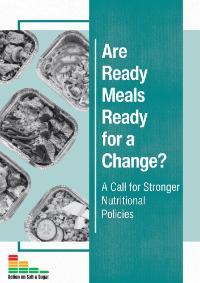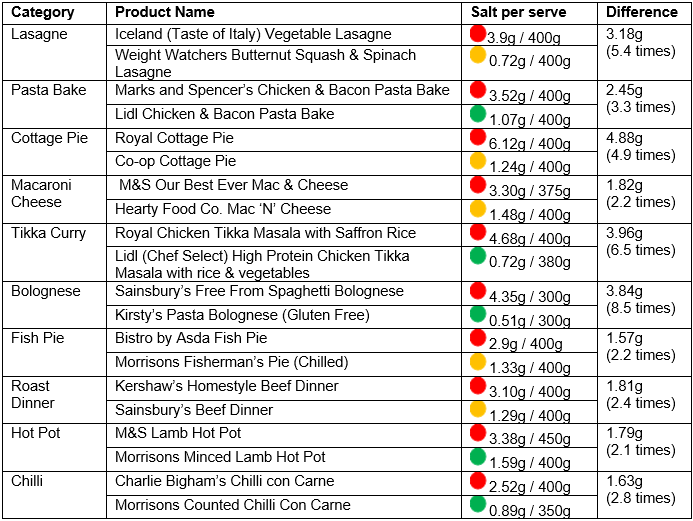Think Before You Heat: Action on Salt Report Finds Over Half of Ready Meals Loaded with Excess Salt
A new, large-scale investigation by Action on Salt has revealed that more than half (55%) of ready meals sold in the UK are excessively high in salt. Surveying 1,511 products from 11 major retailers, Action on Salt calls for urgent government action to enforce stricter, mandatory limits on salt. The findings coincide with Salt Awareness Week (12th–18th May) and are backed by strong public support for regulation.

Read the full report: Ready Meals Report [PDF 27,225KB]
Key Findings
- One in five ready meals are high in salt, fat, and saturated fat, qualifying for three red warning labels under UK front-of-pack labelling.
- 56% are high in salt, 42% high in saturated fat, and 71% are low in fibre, attesting to the poor nutritional quality of mainstream ready meals and posing significant public health risks..
- Iceland is the worst retailer offender, with 84% of its ready meals high in salt.
- 100% of meals from branded lines Wasabi, Jamie Oliver, and Kitchen Joy would trigger red labels for salt.
- Some individual meals, contain more salt than the entire daily recommended limit for an adult, e.g. Royal Cottage Pie with 6.12g in a 400g serve.
Excess salt consumption is directly linked to high blood pressure, heart disease, and stroke. With average daily intake in the UK at 8.4g, well above the recommended 6g, ready meals are a major contributing factor, being among the top three sources of dietary salt.
Weakness of Voluntary Targets
The UK once led globally on salt reduction, but progress has stalled since 2014. Voluntary measures have failed to deliver, with no public report issued on 2024 salt targets and no plans for updates. This has allowed retailers and manufacturers to sidestep reformulation efforts, with widespread variation in salt content across similar meals. For instance, one cottage pie had nearly five times more salt than a lower-salt alternative.
Table 1. Examples of popular ready meal categories with the highest salt content per serve, and a lower salt alternative

Public Backing for Regulation
A national poll commissioned by Action on Salt and conducted by Censuswide [1], shows:
- 43% of consumers would avoid meals with over half their daily salt limit.
- 76% believe food companies should do more to cut salt.
- 80% support stronger government regulation.
For a visual representation of the above, please see our Polling Results [PDF 93KB]
Action on Salt is calling for
- Revitalisation of the national salt reduction programme as a public health priority
- Immediate review of the outdated 2024 salt reduction targets
- Setting new, stricter, mandatory salt targets with financial penalties on food businesses for non-compliance
An open letter co-signed by 31 leading experts and major health charities has been submitted to Public Health Minister Ashley Dalton MP, urging for legislative action to protect public health.
Sonia Pombo, Head of Impact and Research at Action on Salt
“The food industry has had over two decades to reduce salt in our food - and they've failed to deliver. Worse still, the government has let them get away with it by relying on weak, voluntary targets that do little to improve the nutritional quality of food. With over half of ready meals found to be unacceptably high in salt, consumers’ health are being put at serious risk, often without realising it. It should not be this hard to eat healthily. We now need the government to stop pandering to industry interests and introduce mandatory salt reduction targets with real consequences for non-compliance. Enough is enough.”
Dr Pauline Swift – Chair of Blood Pressure UK
“This new survey is a stark wake-up call. Excess salt in our food is directly linked to raised blood pressure – the biggest risk factor for strokes, heart disease and kidney disease – all of which are completely avoidable. Given it is estimated that around 4.2 million adults in England are living with undiagnosed high blood pressure, the government must act now to enforce stronger salt reduction targets and protect public health before even more lives are needlessly lost."
Bryan Williams OBE, chief medical and scientific officer at the British Heart Foundation
“Excess salt consumption is one of the major causes of high blood pressure, which in turn is associated with around half of heart attacks and strokes in the UK. This concerning data shows it is not always straightforward for people to find ready meals which are low in salt. Food companies must do more to reduce salt in their products, so that the healthy options are more easily available. We also need to see the Government create stronger incentives which will ensure the food industry reduces salt levels in food, so that more people can live healthier, longer lives.”
[1] The research was conducted by Censuswide, among a sample of 2,001 nationally representative UK consumers. The data was collected between 25.04.2025-28.04.2025. Censuswide abides by and employs members of the Market Research Society and follows the MRS code of conduct and ESOMAR principles. Censuswide is also a member of the British Polling Council


